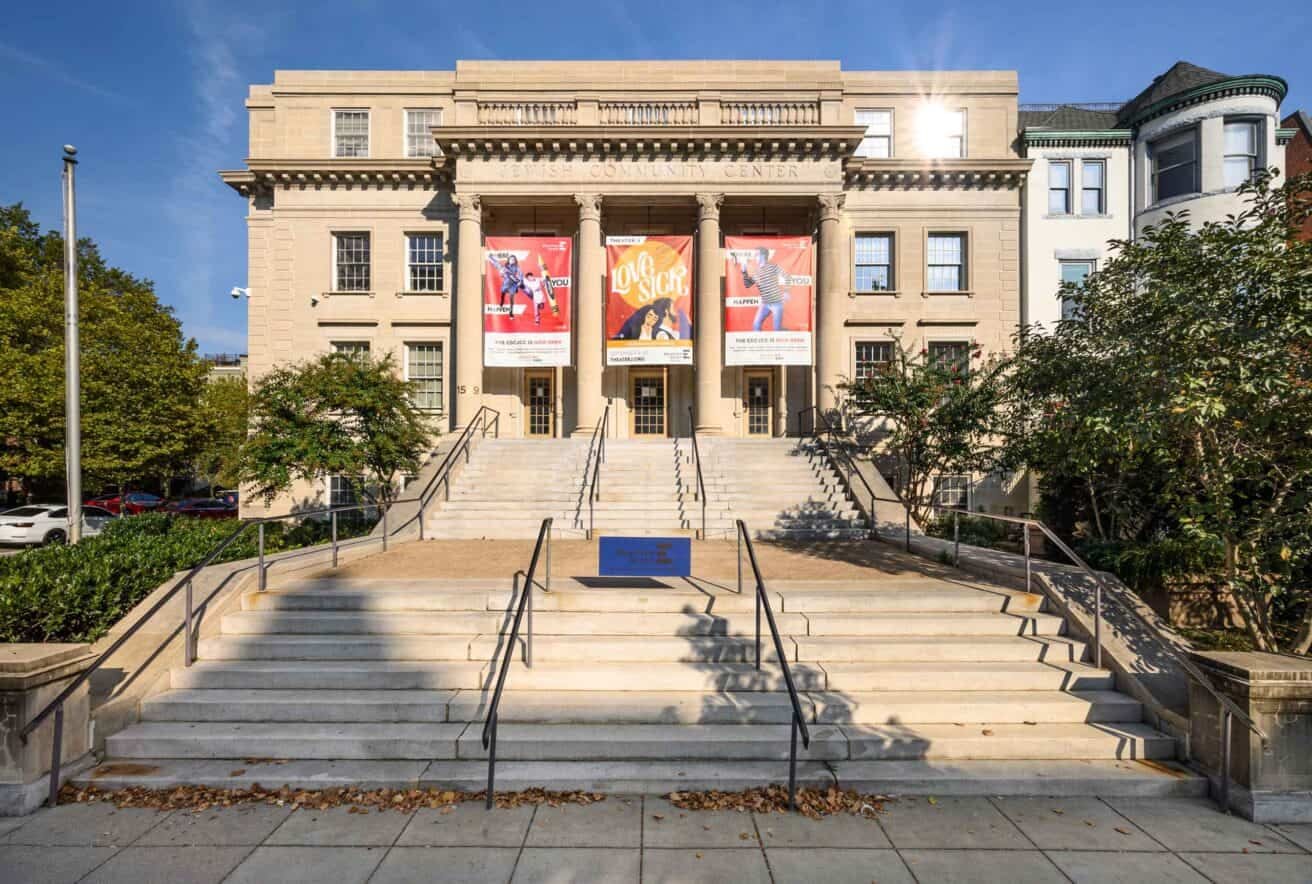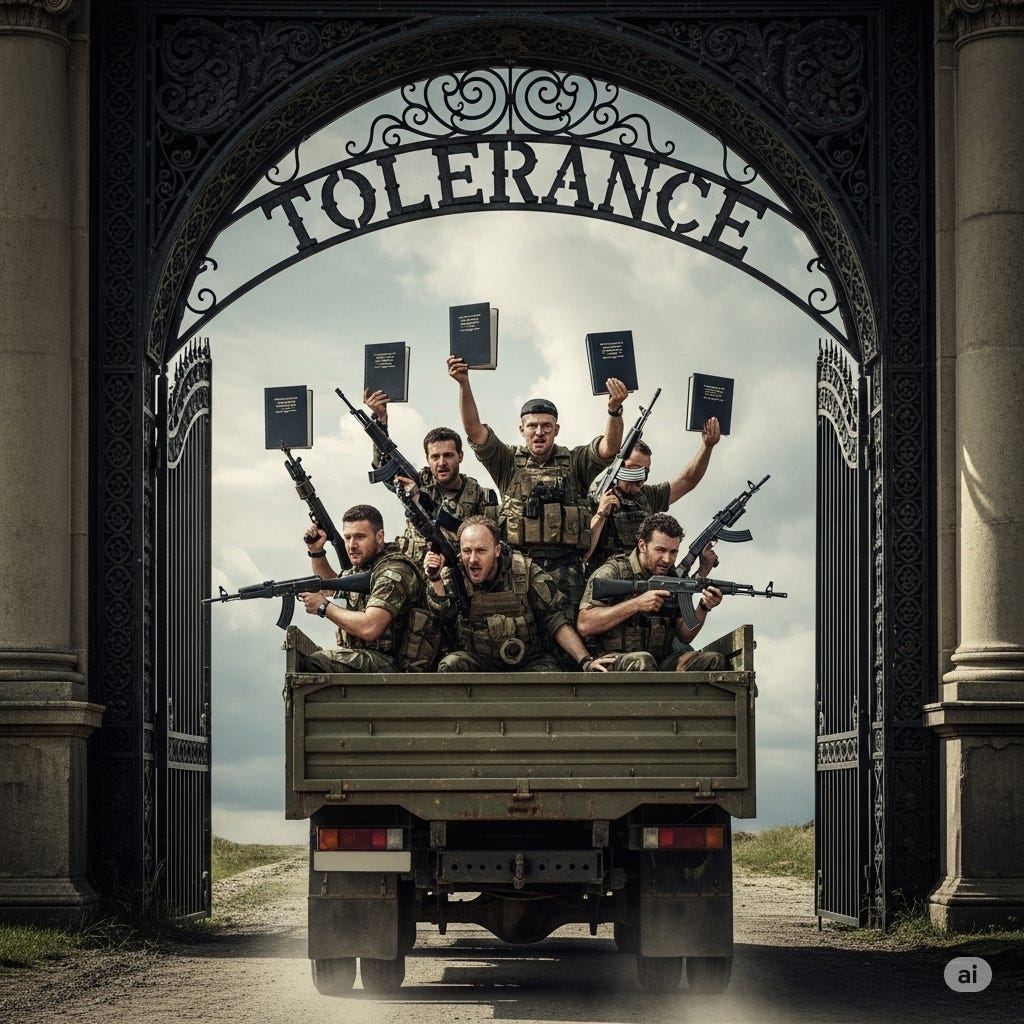The big lesson I learned at preschool
My reply to Daniel Clarke-Serret's "wisdom in crowds and beauty in toleration."
Dear
,Thanks very much for writing and posting The Beautiful Story of Western Toleration, which is your response to my general theory of anti-Semitism, which I wrote to rebut your general theory of anti-Semitism. One more volley and I think all the world’s problems will be solved, the lion and the lamb will meet for tea and cucumber sandwiches, and we can finally shut down our Substacks. :-)
In response to my general theory of anti-Semitism, which I call Narrative Darwinism, you write:
My main criticism flows from just one paragraph, that [Alan] entitles “liberal democrats”. He makes an understandable, yet, in my view erroneous, connection between Liberal Democrats, Enlightenment Scientism and the modern Human Rights Agenda. Allow me to quote the relevant section in full:
“Liberal democrats tell the Enlightenment Story in which Reason and the “discovery” of human rights in the 17th and 18th centuries have finally overcome the darkness and superstitions of the Church, Biblical tradition, and the Divine call for human responsibility. The Biblical Story (writ large) might be tolerated, but it will no longer occupy center stage: Believe whatever myths you’d like, but keep them to yourself.
The state of Israel is the modern incarnation of one of the Bible’s oldest Stories — the one Abraham began on his journey to the Promised Land. It’s a narrative in which Israel has one G*d, but G*d has many people who will one day sit peacefully beneath their own vine and fig trees. It’s a Story that is both universal and particular. By contrast, the liberal vision tends to be aggressively universal (e.g., human rights for everyone everywhere). This is why France, the UK, and Canada are on the cusp of recognizing a Palestinian state: If the liberal, secular, universal narrative is going to live, then the particular, religious, Israeli narrative must die. Palestine is the poison pill.”… To be sure, liberal democratic constitutionalists welcome the advances of science, support reason where properly used and applaud a world with greater respect for human dignity. Yet they also seek to live by the maxim laid down by the ancient Jewish ethicists: “Who is wise? They who learn from every person.” We must learn from scientists as we must learn from Catholics. We must learn from human rights professionals as we must learn from the Jews. Put simply there is wisdom in crowds and beauty in toleration. We can learn from everyone, whatever their narrative.
I agree. The question is: *Where* should this learning take place?
In support of academic discrimination
Think of a university. There’s a lot of learning happening there, but the institution is separated into academic departments, which are effectively intellectual fiefdoms or nation-states, you might say. English… Philosophy… Psychology… Economics… Biology… Physics. Each discipline specializes in a certain way of knowing, prioritizes certain facts and sources, and canonizes particular texts and stories. Few schools will award you an English degree if you’ve never read Shakespeare or written a coherent essay, or a chemistry degree if you know nothing about thermodynamics and the periodic table.
English professors and chemistry professors each have something to teach us about the world, but even they acknowledge that their priorities and first principles are different.
Put another way: Each academic department is telling a Story about the world and how it works. The professors in each department have dedicated their lives to seeing the world through a particular lens and teaching that worldview to their students, who, when they graduate, will spread the good news of Shakespeare or Freud or Adam Smith or Isaac Newton.
In short, the university and its professors discriminate, meaning they “distinguish by discerning or exposing differences.”
Now, a physics major can certainly take an English literature class, and an economics major can study art history. But what happens if a chemistry major stands up in a theater workshop and says: Why aren’t we talking about molecular orbital theory?
What’s on the program?
More than 25 years ago, my kids attended the preschool at the DC Jewish Community Center (DCJCC). Most of the children in the program were Jewish, but not all of them. Some non-Jewish parents enrolled their kids because the facility is beautiful, the programming is creative and engaging, and the teachers are superb.
The preschool’s curriculum and activities emphasized Jewish life. On Fridays, the kids would participate in a Shabbat program. During Passover, they would learn how Moses and G*d helped the Jews escape from Egypt. Before lunch, they’d say a prayer. During recess, the kids would… well, they’d just run around. There’s nothing especially Jewish about recess.
During circle time, however, the floor was open. The teacher would sit the kids down on the carpet and invite them to share a story or experience from their lives outside of school. David went to a Nationals game with his Dad. Mary went to church to celebrate Easter. Ahmed gathered with his extended family to celebrate Ramadan. Everyone was welcome to express themselves, to be fully themselves. But the school’s programming — the top-down instruction — focused on Jewish life.
One day, one of the moms, who is not Jewish, pulled me aside.
“I wish the school would expand its curriculum so the kids could learn about Christmas and Ramadan and Kwanzaa,” she said. “I want my daughter to be exposed to other cultures.”
I confess I was a bit surprised.
“Please don’t take this the wrong way,” I said, “but this is the Jewish Community Center. It says it right above the main entrance. The Jewish programming is the primary reason my children are here — to give them an understanding and appreciation of who they are and how they might engage with the world as Jews.”
“But why shouldn’t my daughter have the opportunity to learn about our family’s traditions?”
“She should!” I said. “If there’s some aspect of your life and your family’s past that you want to instill in your daughter, there are so many options out there. There’s a Baptist preschool just down the street. There’s a Catholic preschool across town, and secular options most everywhere. This preschool focuses on Jewish education.”
Does the JCC discriminate against non-Jews in its admission process? Probably in the same way a tennis club prefers to admit tennis players, and a movie theater prefers to admit people who want to watch a movie. The DCJCC Preschool needs its student body to be mostly Jewish because if it became mostly Christian or Muslim or Hindu, then it would be difficult, if not impossible, to celebrate Shabbat, Passover, Purim, and Simchat Torah. The DCJCC is essentially Israel, writ small.
To demand that the DCJCC provide Christian programming would be like demanding that a university’s English department offer classes in organic chemistry: It’s a worthy subject to study, but it’s best taught by the experts over at the science center.
The virtue of nationalism
I’ve been a critic of Israeli political philosopher Yoram Hazony, but I have a hard time disagreeing with this observation:
The nationalism I grew up with is a principled standpoint that regards the world as governed best when nations are able to chart their own independent course, cultivating their own traditions and pursuing their own interests without interference. This is opposed to imperialism, which seeks to bring peace and prosperity to the world by uniting mankind, as much as possible, under a single political regime…. An order of independent nations would permit diverse forms of self-government, religion, and culture in a “world of experiments” that would benefit all mankind.”
So,
, when you write this:… We must learn from scientists as we must learn from Catholics. We must learn from human rights professionals as we must learn from the Jews. Put simply there is wisdom in crowds and beauty in toleration. We can learn from everyone, whatever their narrative.
… I wholeheartedly agree. But again, where should this education take place?
Or, to extend my university analogy: Should your beloved England continue to serve as the world’s English department that teaches us about English history, culture, and values? Or should England and its people abandon their national particularity to embrace a pure universalism?
This is the fear now spreading across England, France, and other parts of the West:
Yes, I understand why this image might be condemned as Islamophobic, but the uncomfortable question remains: How should a post-imperial United Kingdom (and the rest of the West) respond to an Islamic world that is awakening from its long slumber, breaking the yoke of European colonialism, rediscovering its 1,400-year-old civilizational narrative, and marching across the globe on its divinely ordained imperial mission to bring all of us to Allah?
I do not doubt that Islam has something unique to teach us. So do Christianity and Judaism. But I also believe the world works best when each of our traditions has a home to call its own.
all the best,
Alan







Thanks so much Alan for the article. I will reflect and get back to you in my own inimitable way!
I loved the conversation with the mom about wanting her daughter to learn about other traditions. This is Jewish Day School. Exactly. I think that the biggest problem we created is this idea of diversity and multiculturalism. That only works in Gene Roddenberry's world (and not so great even there... the Borg of Next Generation fame comes to mind).